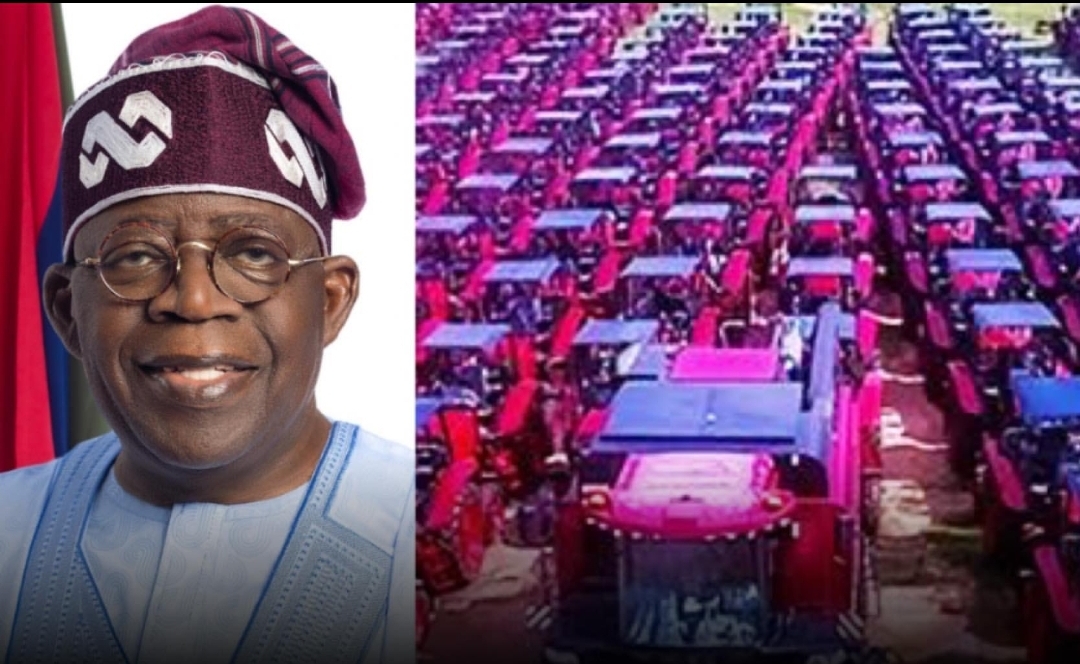
Four Months After Tinubu’s ₦50bn Tractor Launch, Machines Gather Dust as Bureaucracy Stalls Deployment

Four months after President Bola Ahmed Tinubu unveiled ₦50 billion worth of tractors and farm machinery to revolutionize Nigeria’s agricultural sector, the equipment remains unused — locked away at the National Agricultural Seed Council (NASC) headquarters in Abuja. The much-touted initiative, once hailed as a bold stride toward food security and youth empowerment, now stands as a stark reminder of Nigeria’s recurring battle with bureaucratic inertia.
Launched with fanfare in June 2025, the project featured an impressive array of 2,000 tractors, 2,000 disc ploughs and harrows, 1,000 ridgers, 1,200 trailers, 500 seed drills, and several other modern implements. During the ceremony — attended by Belarusian officials, whose nation supplied part of the equipment — President Tinubu had promised a “monumental leap forward” toward agricultural independence.
> “We are taking a monumental leap forward with the introduction of state-of-the-art agricultural equipment… This is a bold step towards achieving complete agricultural independence,” Tinubu declared at the launch.
However, the promised revolution has yet to reach the farmlands. Sources within the Ministry of Agriculture and Food Security told The Guardian that the tractors remain grounded because the ministry is still “awaiting directives from the Presidency” on how to proceed with distribution. According to insiders, the entire process has slowed down significantly since the public launch, with ministry officials unwilling to act without explicit approval from higher authorities.
Agriculture Minister Abubakar Kyari had earlier proposed three models for deployment — direct sales, leasing, and tractor service centres — to ensure affordable access for smallholder farmers and encourage mechanized farming. Yet, those plans have stalled, leaving millions of Nigerian farmers struggling with manual labour, rising input costs, and limited access to mechanization as the planting season approaches its end.
Daniel Okafor, Vice President of the All Farmers Association of Nigeria (AFAN), expressed frustration over the prolonged silence from government quarters.
> “We were very happy at the launch, but we are still waiting and monitoring the sharing formula,” he said.
Agricultural experts are equally alarmed. Professor Simon Tuange of Joseph Sarwuan Tarka University cautioned that the delay could render the entire project ineffective if the tractors miss the current farming window.
> “Agriculture without mechanisation is like a vehicle without wheels,” Tuange warned, urging the government to pair deployment with maintenance workshops to prevent the expensive machinery from deteriorating.
The ₦50bn mechanization drive, part of Tinubu’s Renewed Hope agricultural initiative, was designed to enhance food self-sufficiency, create rural jobs, and reduce Nigeria’s $10 billion annual food import bill. But with the equipment sitting idle and the farming season slipping away, farmers fear that the initiative could go the way of previous government schemes — grand on paper but lifeless in execution.
As frustration grows, analysts say the episode underscores a deeper governance challenge: Nigeria’s tendency to announce ambitious projects without functional delivery mechanisms. For now, the tractors meant to drive a new era of agricultural prosperity remain motionless — victims of the very bureaucracy they were meant to overcome.


